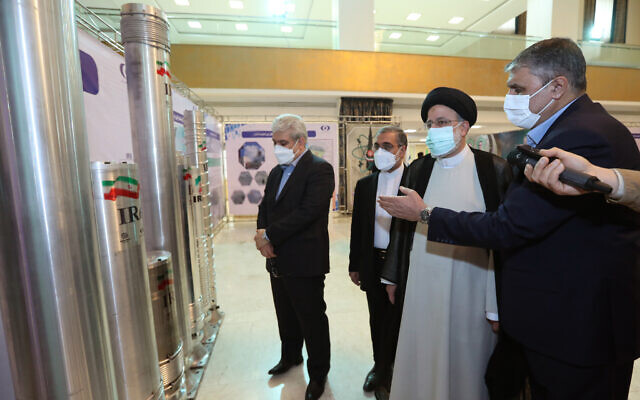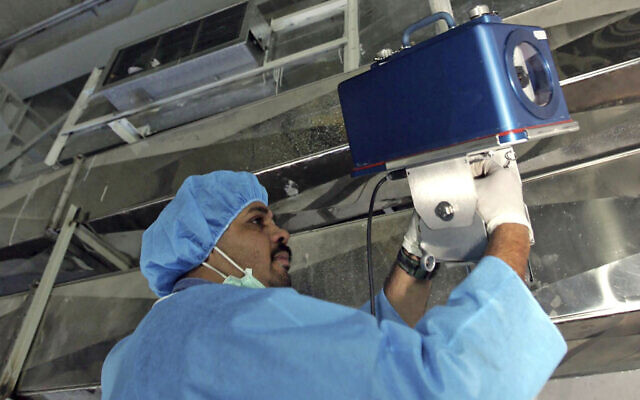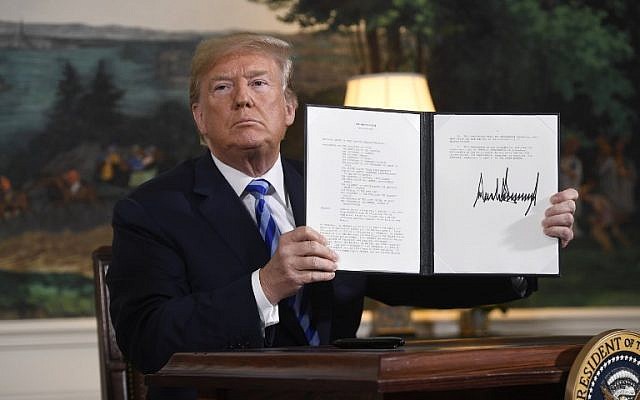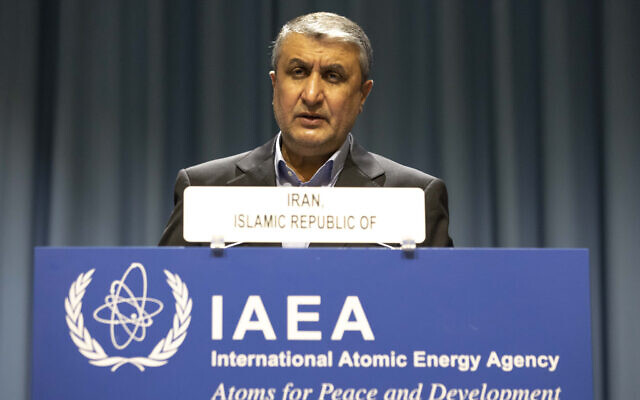Bennett applauds motion brought by US, Britain, France and Germany as exposing Iran’s ‘true face’; Russia and China oppose resolution

The UN nuclear watchdog formally censured Iran over its nuclear program on Wednesday, hours after the Islamic Republic said it disconnected some of the International Atomic Energy Agency’s cameras monitoring its nuclear sites.
The move by Iran’s atomic agency came in anticipation of ratification of the censure, drafted after the Vienna-based IAEA raised concerns about traces of enriched uranium previously found at three sites Tehran had not declared as having hosted nuclear activities.
The UN nuclear watchdog formally adopted the censure, diplomatic sources told AFP, after it was submitted by Britain, France, Germany and the United States.
The censure — the first to criticize Iran since June 2020 — was approved by 30 members of the IAEA board of governors, with only Russia and China voting against it, according to two diplomats.
However, the motion is largely symbolic and does not threaten any specific actions from world powers against Iran.
Prime Minister Naftali Bennett praised the decision, saying it “affirms that Iran is not cooperating with the IAEA and does not obey its rules, thus it is not possible for the agency to fulfill its important role to act against nuclear military operations.”
“This is a significant decision that exposes Iran’s true face,” Bennett said.
The decision “states that Iran is not cooperating with the IAEA and does not follow its instructions,” he said. “The vote today at the IAEA constitutes a clear warning to Iran: If Iran continues with its activities, the leading countries need to bring the Iranian issue again to the UN Security Council.”
Defense Minister Benny Gantz said the IAEA “took an important step in its decision to censure Iran following its noncompliance with inspections.”
“Iran has demonstrated once again that it threatens both regional and global peace,” Gantz said. “The international community must take concrete steps. Every monitoring device that is turned off should be met with diplomatic and economic sanctions.”

Iran said the cameras it has disconnected had been operating as a “goodwill gesture,” outside its safeguard agreement with the IAEA.
“As of today, the relevant authorities have been instructed to cut off the On-Line Enrichment Monitor and the flow meter cameras of the agency,” said the Atomic Energy Organization of Iran, referring to the UN agency’s cameras.
The group added that Iran’s agreement to allow the cameras to run was not “appreciated” by the UN agency but considered an “obligation.”
Its statement did not specify how many cameras had been turned off, but said “more than 80 percent of the agency’s existing cameras are operating according to the safeguard agreement and will continue to operate just as before.”
Behrouz Kamalvandi, spokesman for the Iranian agency, had “monitored the shutdown of two IAEA cameras at a nuclear facility,” the statement added.
“Other measures are being considered and we hope that they will come to their senses and respond to Iran’s cooperation with cooperation,” he told state TV.
‘Counterproductive’
The US State Department said that Iran’s reported move, if confirmed, was “extremely regrettable” and “counterproductive” to attempts to revive the 2015 nuclear deal.

Iran reached the deal limiting its nuclear program in return for sanctions relief — but the agreement has been on life support since then-president Donald Trump unilaterally withdrew the United States from it in 2018.
Tehran, which denies seeking to build a nuclear bomb, has backed away from some of its own commitments since 2019.
European capitals have expressed mounting concern over how far Iran has gone in resuming nuclear activities since the US began reimposing sanctions in 2018.
Iran has built up large stockpiles of enriched uranium, some of it enriched to levels far higher than those needed for nuclear power generation.
‘No hidden activities’
Iran’s nuclear organization chief Mohammad Eslami had said earlier Wednesday that “Iran has no hidden or undocumented nuclear activities or undisclosed sites,” state news agency IRNA reported.
“These fake documents seek to maintain maximum pressure” on Iran, he added, referring respectively to the three sites that the IAEA is concerned about and the crippling economic sanctions reimposed by Washington under Trump.

“This recent move by three European countries and the US by presenting a draft resolution against Iran is a political one,” Eslami said, adding Iran had maintained “maximum cooperation” with the IAEA.
The UN watchdog has said its questions about the three sites were “not clarified” in its meetings with Iranian authorities.
The talks to revive the 2015 nuclear accord started in April 2021 with the aim of bringing the United States back in, lifting sanctions and getting Iran to return to the limits it agreed to on its nuclear activities.
But negotiations have stalled in recent months and the European Union’s top diplomat Josep Borrell warned last weekend that the possibility of returning to the accord was “shrinking.”
IAEA head Rafael Grossi said Monday that it would be “a matter of just a few weeks” before Iran could get sufficient material needed for a nuclear weapon if it continued to develop its program.
As reported by The Times of Israel
